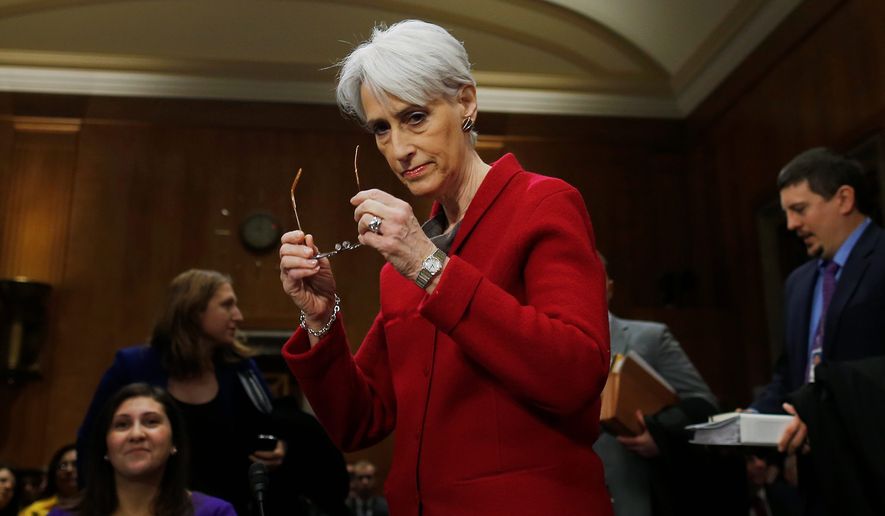President Biden’s nominee for the number two State Department leadership post says that if confirmed, she’ll fight to block Russia’s controversial Nord Stream 2 gas pipeline to Western Europe.
“I will do everything I possibly can to ensure that Nord Stream 2 does not go forward,” Deputy Secretary of State nominee Wendy Sherman told lawmakers weighing her nomination on the Senate Foreign Relations Committee Wednesday.
Ms. Sherman pushed back against criticism from Republicans and some Democrats, who claim the Biden administration is deliberately ignoring pressure from Congress to level sanctions against Russian and German companies involved in the pipeline’s construction.
“I do not believe that the Biden-Harris administration has been soft on Russia in any way, shape or form,” she said during an exchange with Sen. Ted Cruz, Texas Republican, who argued the administration has dropped the ball on Nord Stream since taking office in January.
“Words are cheap,” said Mr. Cruz, who asserted that “if the Biden administration wishes to not be soft on Russia, rather than saying ‘we don’t want to be soft on Russia,’ they could actually follow the mandatory law and stop the pipeline.”
The senator was referring to legislation passed late-2020 mandating the White House to deliver a report to Congress on companies involved in Nord Stream that may be subject to sanctions. While the legislation set in motion the process for authorizing the president to level sanctions against Russian and German firms, it does not explicitly mandate such sanctions.
However, lawmakers from both parties have written to the Biden administration in recent weeks pressuring the White House to act on the legislation, while also voicing bipartisan concern that a completed Nord Stream 2 pipeline would hand Russian President Vladimir Putin key strategic leverage over Western Europe.
Mr. Cruz claimed Wednesday that the administration did a poor job in delivering a report on the matter to Congress last month.
“Last month the State Department transmitted a mandatory and overdue report to Congress about who is helping Putin build the pipeline. The report included one ship and its owner, which the Trump administration had already sanctioned — so it simply reiterated what the Trump administration had done,” the Texas Republican said. “It didn’t include any entities that are plainly in violation — not even the company that is actually constructing the pipeline, [which] Congress has instructed the president to sanction.”
Mr. Cruz lamented that the Biden administration missed an opportunity to address Nord Stream in sanctions it leveled against Russia this week in response to Moscow’s poisoning and jailing of Russian opposition figure Alexei Navalny. “Those sanctions went out of their way not to touch the Nord Stream 2 pipeline,” the senator said. “That was not an accident.”
“If the Biden admin doesn’t change course,” Mr. Cruz said, “we’re going to wake up in six months or a year and this pipeline is going to be built because this administration failed to act.”
The geopolitics surrounding Nord Stream 2 have long been vexing, as U.S. ally Germany has been shaken by heated internal fighting over on-again-off-again German government efforts to facilitate the pipeline to ease the energy needs of its own people as well as other populations across Western Europe.
Ken Silverstein, a longtime global energy sector journalist underscored the complexity of the issue in a column published by Forbes last October, explaining that while the pipeline is about 90 percent completed, “Russia does not have the technology to finish the job.”
“The United States is opposed to the pipeline, saying that it gives Russia too much power over Western Europe as well as parts of Eastern Europe that also gets some gas from Russia: Lithuania, Poland and Ukraine, to name three,” Mr. Silverstein wrote, adding that potential U.S. sanctions could target “companies that are trying to help Russia finish the project. That includes Royal Dutch Shell and Engie, and German companies Uniper and Wintershall DEA.”
The column noted that Russia — as of last year — was already supplying roughly 40 percent of Eruope’s natural gas. Mr. Silverstein also cited the European Commission as saying the United States was supplying 3.5 percent of the gas going to Europe, with a third of all U.S. Liquified Natural Gas (LNG) having gone to the European Union between January and November 2019.
How the U.S. share of the market will be impacted if Nord Stream 2 goes is halted or goes forward is a subject of debate among analysts.
• Guy Taylor can be reached at gtaylor@washingtontimes.com.




Please read our comment policy before commenting.